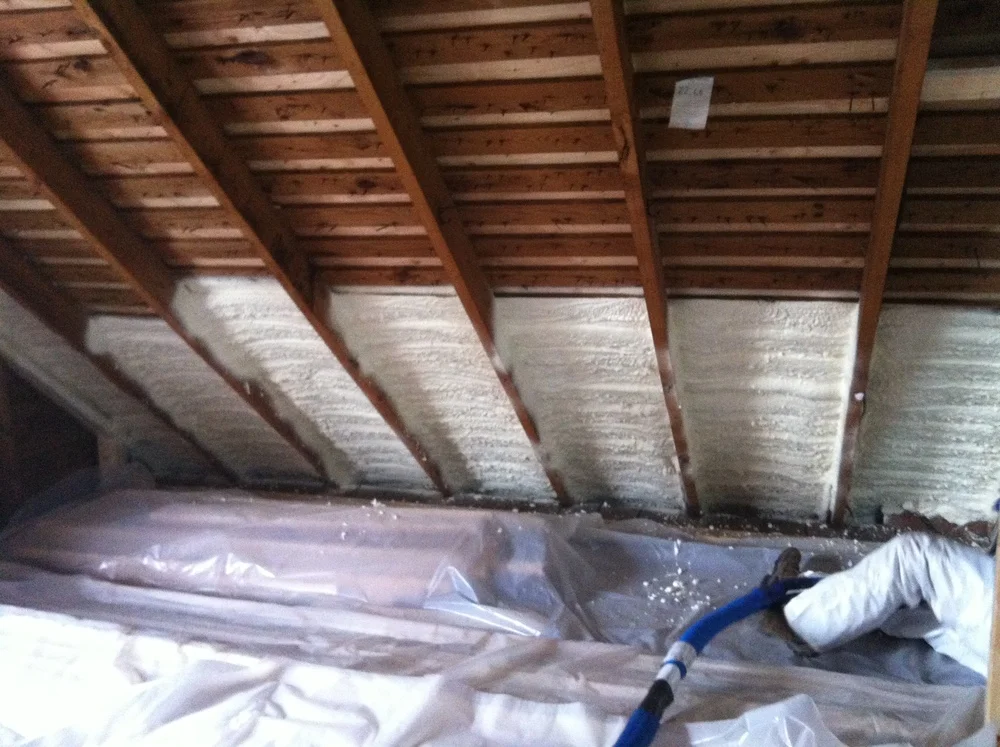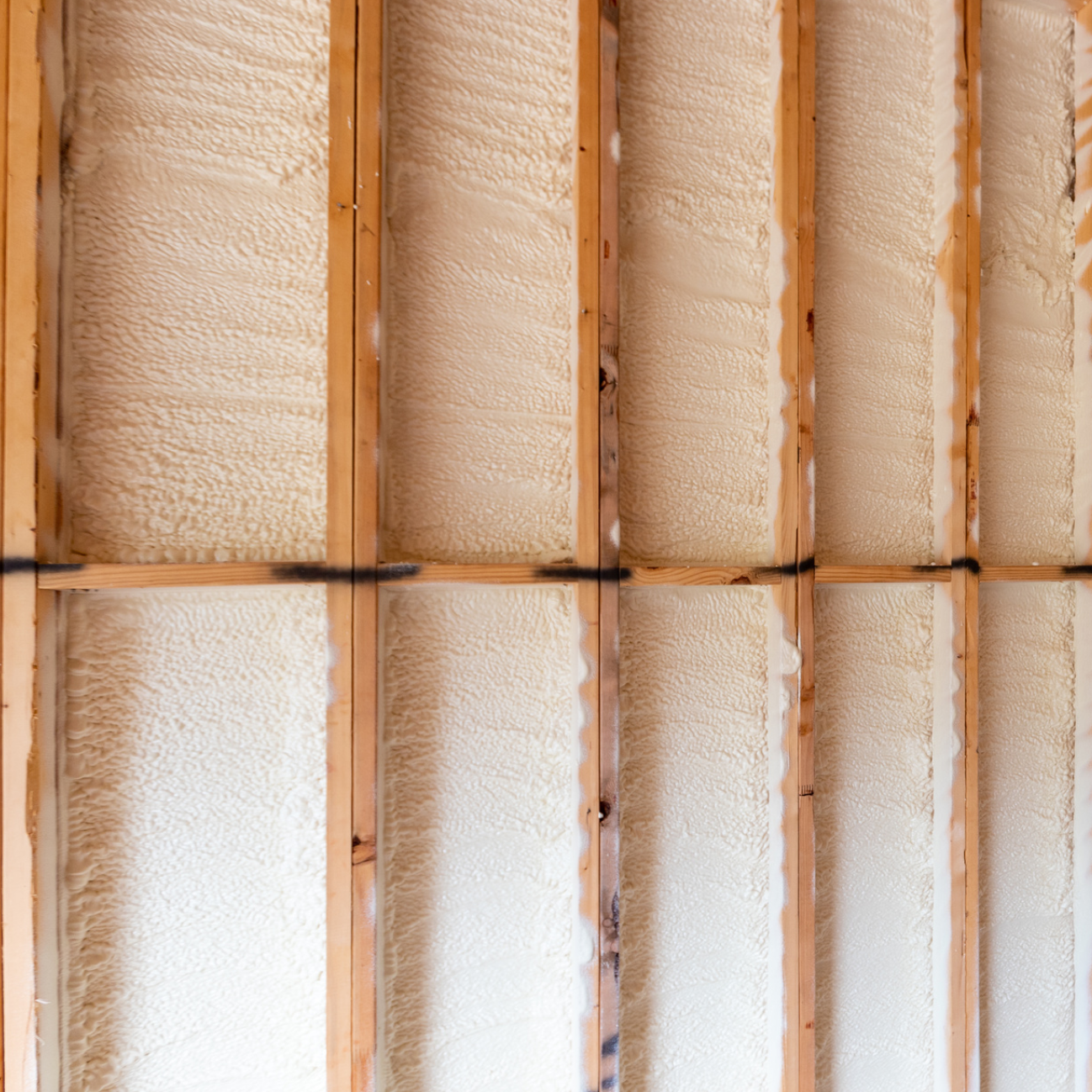How Spray Foam Can Enhance Power Performance in your house
Wiki Article
Spray Foam: The Ultimate Remedy for Air Sealing and Insulation
Spray foam insulation has actually arised as a leading option for efficient air sealing and thermal insulation, using an unique combination of residential or commercial properties that set it apart from traditional methods. Understanding the complete extent of its benefits, installment processes, and contrasts with various other insulation kinds is important for making notified choices.What Is Spray Foam?
Spray foam is a flexible insulation material that integrates the concepts of air securing and thermal resistance to improve power effectiveness in structures. Made up primarily of polyurethane or various other similar substances, spray foam is used as a liquid that broadens upon contact with surface areas, producing a solid, continual layer of insulation. This unique building enables it to fill up spaces, splits, and gaps that conventional insulation materials may overlook, supplying an exceptional air seal.There are two main kinds of spray foam: open-cell and closed-cell. Open-cell spray foam is lighter and much more versatile, using superb audio absorption and a lower R-value per inch - Spray Foam. On the other hand, closed-cell spray foam is denser, giving a greater R-value, moisture resistance, and added structural stability to constructing components
The application procedure normally entails specialized devices, making sure a seamless application that follows various substrates, including metal, concrete, and timber. This adaptability makes spray foam suitable for both new building and constructions and retrofitting existing structures. Its capability to develop a closed barrier substantially adds to reducing energy usage and improving interior air top quality, therefore making it a favored option among house owners and builders alike.
Benefits of Spray Foam Insulation
Among the most substantial benefits of spray foam insulation is its exceptional ability to create a continual air barrier, which successfully lessens energy loss. Unlike traditional insulation products, spray foam expands to fill up splits and spaces, ensuring that air leakage is significantly decreased. This particular not just boosts power efficiency however also brings about reduce utility expenses gradually.
Furthermore, spray foam insulation offers premium thermal resistance, adding to a more secure interior environment. Its high R-value per inch permits reliable insulation in confined areas, making it perfect for attic rooms, walls, and crawl rooms. Moreover, the moisture-resistant residential or commercial properties of spray foam help stop mold and mildew and mold growth, advertising much healthier living problems.
Another essential benefit of spray foam insulation is its sound-dampening qualities (Spray Foam). It efficiently decreases sound transmission between areas, developing a quieter and much more comfy home environment. The toughness of spray foam likewise sticks out, as it does not sag or clear up with time, maintaining its efficiency throughout its life-span
Exactly How Spray Foam Works
Understanding exactly how spray foam insulation works is essential for valuing its performance in air securing and thermal resistance. Spray foam insulation consists of two key parts: isocyanate and polyol material. When these elements are blended, they undertake a chain reaction that creates the product to broaden quickly, creating a thick foam that fills spaces, fractures, and tooth cavities.As the foam increases, it adheres to surface areas, creating an airtight seal that significantly minimizes air infiltration. This characteristic makes spray foam insulation highly efficient at protecting against drafts and moisture infiltration, which can result in power loss and damage in time. In addition, the closed-cell variation of spray foam supplies exceptional thermal resistance because of its rigid structure, efficiently minimizing warmth transfer.
The special residential or commercial properties of spray foam allow it to comply with irregular surfaces, making certain extensive see here protection and a seamless barrier. As a result, spray foam insulation not only boosts energy effectiveness yet additionally adds to enhanced indoor air top quality by decreasing the accumulation of toxins and irritants. Ultimately, comprehending the mechanics behind spray foam emphasizes its duty as an exceptional option for insulation and air securing in both industrial and property applications.
Setup Process Review

Before setup, the room has to be adequately cleaned and prepped, guaranteeing that surfaces are complimentary from debris, moisture, and dust. Since impurities can compromise adhesion and overall performance, this step is critical. When the location is prepared, the application entails mixing both parts of the spray foam, which increases upon call and fills up voids efficiently.
Educated experts ought to conduct the setup, using specialized tools to guarantee uniform coverage and optimum density. Safety and security precautions, including putting on protective equipment and guaranteeing appropriate ventilation, are vital throughout this process. After application, the foam typically treatments quickly, forming a strong barrier that improves energy efficiency.
Contrasting Spray Foam to Traditional Insulation
When reviewing insulation alternatives, spray foam insulation stands out in contrast to traditional materials such as fiberglass and cellulose. Unlike fiberglass and cellulose, which can enable air seepage, spray foam broadens upon application, loading voids and crevices to produce an impermeable seal.Furthermore, spray foam supplies a higher R-value per inch than standard insulation kinds, providing even more efficient thermal resistance in a thinner account. This characteristic is particularly valuable in spaces with minimal cavity depth. Spray foam is resistant to moisture and mold and mildew development, which can be a considerable problem with cellulose and fiberglass, particularly in moist settings.
Nonetheless, spray foam insulation commonly carries a higher in advance price than its standard equivalents. House owners have to weigh this first financial investment against lasting power cost savings and efficiency advantages. Eventually, read the full info here while both insulation types offer their function, spray foam becomes an advanced option for contemporary insulation requirements, specifically in regards to air securing and thermal effectiveness.

Verdict
In summary, spray foam insulation stands for an extremely reliable remedy for achieving optimal air securing and thermal resistance. Its distinct buildings, consisting of moisture resistance and audio dampening, make it appropriate for numerous applications in both new constructions and retrofitting projects (Spray Foam). The first costs might be higher compared to traditional insulation products, the long-term benefits, such as substantial energy financial savings and enhanced indoor air top quality, warrant the financial investment and emphasize its worth in modern-day structure practices.Spray foam insulation has actually emerged as a leading solution for effective air sealing and thermal insulation, supplying a special mix of homes that establish it apart from conventional methods.Spray foam is a versatile insulation product that combines the concepts find out of air securing and thermal resistance to improve energy effectiveness in structures.When evaluating insulation choices, spray foam insulation stands out in comparison to traditional materials such as fiberglass and cellulose. Inevitably, while both insulation types offer their function, spray foam arises as an extra sophisticated option for modern-day insulation demands, particularly in terms of air sealing and thermal performance.
In recap, spray foam insulation represents a highly reliable solution for accomplishing ideal air securing and thermal resistance.
Report this wiki page